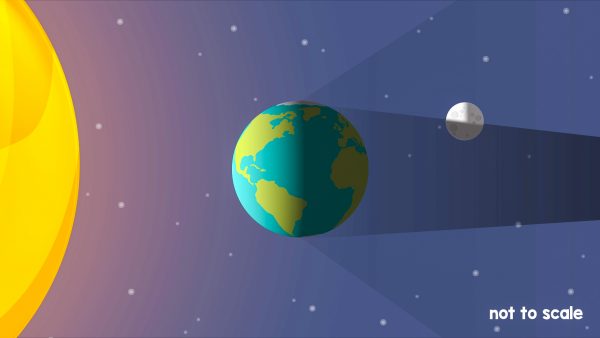Total Eclipse Definition
A total eclipse occurs when Earth or the Moon blocks Sun's light fully. For example, during a solar eclipse, the Moon covers the Sun, casting shadow on Earth.
View Lesson on Solar & Lunar Eclipses
Become a member to get full access to our entire library of learning videos, reading material, quiz games, simple DIY activities & more.
Become a member to get full access to our entire library of learning videos, quiz games, & more.
Plans & Pricingto watch this full video.

Access All Videos
and Lessons, No Limits.
Access All Videos

No credit card required,
takes 7 sec to signup.
No card required

Ready-to-go lessons
that save you time.
Ready-to-go lessons
If you are on a school computer or network, ask your tech person to whitelist these URLs:
*.wistia.com, fast.wistia.com, fast.wistia.net, embedwistia-a.akamaihd.net
Sometimes a simple refresh solves this issue. If you need further help, contact us.
Solar & Lunar Eclipses
Fun Facts
- During a total solar eclipse, the Sun's corona becomes visible.
- A total lunar eclipse can appear reddish, known as a Blood Moon.
- If the Moon was smaller, it would not be able to cover the entire Sun during a total solar eclipse.
Why Do We Need To Know About Total Eclipse
Learning about total eclipses helps us understand space better and shows why they’re important for space scientists. Eclipses help find new planets far away when these planets pass in front of their stars, making them dim a bit, which we can see from Earth. This way, scientists have found more than 2000 planets, including some that might be like Earth, such as Kepler 62F.
Also, total eclipses let scientists study the sun’s outer layer and learn more about the sun and our atmosphere. Knowing when eclipses will happen has been useful for a long time and is still important in space science, showing how studying eclipses can lead to interesting jobs and discoveries.
Frequently Asked Questions
Check out the Full Lesson on Solar & Lunar Eclipses
In this lesson, we learn that:
- A model of the solar system can explain eclipses of the sun and the moon.
- A solar eclipse happens when our view of the sun is blocked by the moon.
- A lunar eclipse happens when the moon passes into Earth's shadow.
Related Topics
- Adaptation Definition
- Astronomy Definition
- Bacteria Definition
- Balanced Force Definition
- Binary Code Definition
- Biochemistry Definition
- Biotechnology Definition
- Cast Fossils Definition
- Chloroplasts Definition
- Chromosome Definition
- Corona Definition
- Definition Of Evidence
- Definition Of Science
- Definition Of Shade
- Earth’s Rotation Definition
- Ecosphere Definition
- Electric Charge Definition
- Electricity Definition
- Engineer Definition
- Extinct Definition
- Fossil Record Definition
- Hydrosphere Definition
- Larvae Definition
- Law Of Conservation Of Matter Definition
- Lunar Eclipse Definition
- Natural Resource Definition
- Natural Selection Definition
- Paleontologist Definition
- Partial Eclipse Definition
- Photosynthesis Definition
- Physical Map Definition
- Plant Growth Definition
- Pollen Definition
- Precipitation Definition
- Problem Definition
- Properties Of Matter Definition
- Reactants Definition
- Recycle Definition
- Sediment Filter Definition
- Simple Machines Definition
- Solar Eclipse Definition
- Solid Definition
- Solution Definition
- Thermometer Definition
- Tides Definition
- Total Eclipse Definition
- Trait Definition
- Volcano Definition
Start a Free Trial Today. Get a $5 Amazon Gift Card!
Teachers! Start a free trial & we'll send your gift card within 1 day. Only cards left. Try it now.
Select Grade
Select Subject
This email is associated with a Science Kit subscription. Kit subscriptions are managed on this separate page: Manage Subscription

-
Download InvoiceScience & Math$/yr
-
Download InvoiceScience Only$/yr

access all lessons
• No credit card required •
"My students loved the videos. I started the video subscription in May and used them as a review before the state test, which I know contributed to 100% of my class passing the state test."
Rhonda Fox 4th Grade Teacher, Ocala, Florida
• No credit card required •
"My students loved the videos. I started the video subscription in May and used them as a review before the state test, which I know contributed to 100% of my class passing the state test."
Rhonda Fox 4th Grade Teacher, Ocala, Florida
• No credit card required •
Already a member? Sign In
* no credit card required *

* no credit card required *
* no credit card required *


no credit card required
Skip, I will use a 3 day free trial
Enjoy your free 30 days trial
-
Unlimited access to our full library
of videos & lessons for grades K-5. -
You won’t be billed unless you keep your
account open past your 14-day free trial. -
You can cancel anytime in 1 click on the
manage account page or by emailing us.
-
Unlimited access to our full library of videos & lessons for grades K-5.
-
You won't be billed unless you keep your account open past 14 days.
-
You can cancel anytime in 1-click on the manage account page.
Cancel anytime in 1-click on the manage account page before the trial ends and you won't be charged.
Otherwise you will pay just $10 CAD/month for the service as long as your account is open.
Cancel anytime on the manage account page in 1-click and you won't be charged.
Otherwise you will pay $10 CAD/month for the service as long as your account is open.
We just sent you a confirmation email. Enjoy!
DoneWe use cookies to make your experience with this site better. By using this site you agree to our use of cookies. Click "Decline" to delete and block any non-essential cookies for this site on this specific property, device, and browser. Please read our privacy policy for more information on the cookies we use.Learn More
We use cookies to improve your experience. By using this site, you agree to our use of cookies. Click "Decline" to block non-essential cookies. See our privacy policy for details.Learn More



























































































































